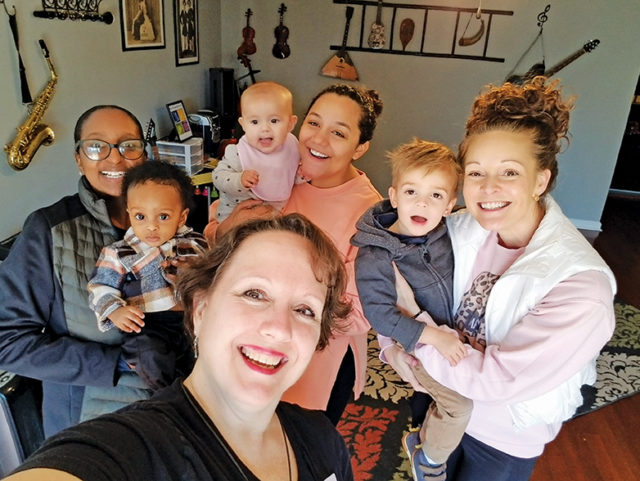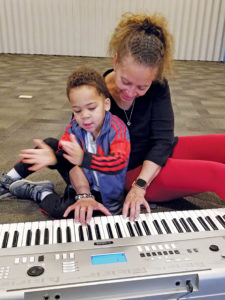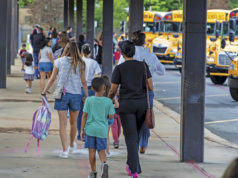
By Lauren “LaLa” McBride
The Gift of Music Foundation was established in 2015 to create greater access to musical instruments, education, and the many benefits of studying music. Since then, we have been able to impact thousands of students and dozens of music programs throughout metro Atlanta. But what can we truly gain from interacting with music? Could it help prevent mental illness and set children up for successful living? The benefits are numerous, and some may surprise you!
Brain organization and stimulation begins before birth
Music and movement in the early years helps to stimulate multiple sections of the brain simultaneously while organizing and connecting the growing brain synapses. From 4.5 months in utero, most infants are hearing and absorbing patterns, pitches, and more from their surroundings. Picture their environment inside the mother: A fetus is encompassed in the rhythm of her heartbeat and the whoosh of fluids in the womb, so rhythms are already part of their life. Studies have shown that brains are most stimulated by classical music, including an increase in blood oxygen levels and suckling in premature babies. Well-organized rhythms of music, especially those created by geniuses such as Mozart, help organize the brain to better understand math and language more easily from the start. It doesn’t make children smarter, but it primes the brain for better processing and understanding.
In addition to musical rhythms, infants also feel and hear emotions and related muscle responses from their mother. If your infant sees or feels you jump and shriek as a fear response, for instance when you see a spider, their brain is saving that experience as how they’re supposed to handle that situation. But the same happens with positive experiences and the love they feel, as well. Therefore, keeping a more positive musical environment and modeling good responses to stress, fear, anger, and social connections is extremely important. Knowing this can help us to be more aware of how we act and react to our surroundings when children are around. Just because they may be too young to talk about emotions and experiences, doesn’t mean they don’t have them! A functioning ear never turns off.
Positive human connections help people learn
 As infants grow into toddlers and preschoolers, they gain more awareness of their surroundings and eagerly try to connect with them. It can be exhausting for the adult caring for them, but literally everything they are experiencing is a new interest, challenge, or experience. Those are teachable moments, so use that curiosity to engage them! You might notice your child seems obsessed with cords and electrical items, or shapes like words/numbers/puzzles. If you pay attention to those signs and figure out their learning style (visual, aural, verbal, etc.), you may realize they are showing signs of being a future mechanic/engineer, scholar, artist, or architect! You can use their interest and learning styles to help build self-esteem, follow passions, and fill the learning gaps. What better way to connect, have fun, and advance their style of learning than through music! The most important learning attributes in the birth-to-preschool age group (or people whose brains are functioning at that level) include the following:
As infants grow into toddlers and preschoolers, they gain more awareness of their surroundings and eagerly try to connect with them. It can be exhausting for the adult caring for them, but literally everything they are experiencing is a new interest, challenge, or experience. Those are teachable moments, so use that curiosity to engage them! You might notice your child seems obsessed with cords and electrical items, or shapes like words/numbers/puzzles. If you pay attention to those signs and figure out their learning style (visual, aural, verbal, etc.), you may realize they are showing signs of being a future mechanic/engineer, scholar, artist, or architect! You can use their interest and learning styles to help build self-esteem, follow passions, and fill the learning gaps. What better way to connect, have fun, and advance their style of learning than through music! The most important learning attributes in the birth-to-preschool age group (or people whose brains are functioning at that level) include the following:
1. Providing daily rituals to help them learn basic executive functions,
2. Giving positive experiences of love and care to learn trust, and
3. Seeking close, individual and group connections with peers and adults to learn social cues and empathy.
Quality music and movement classes provide an opportunity for all of this in one setting! If family members and teachers focus on these areas of connection, we can help children to be more prepared to learn and self-regulate (control behavior and reactions). This can prevent many issues with mental illness and help our children to be more resilient as they grow into adulthood.
Something as simple as connecting with a child’s eyes helps them feel seen and know they are worthy of attention. That alone can support good self-esteem! If a child is isolated while learning, the information is like a fleck of dust that doesn’t stick. When the same thing is learned through interaction and connection with another person (peer or adult), it’s more like glitter that sticks firmly in memory due to the emotional, social, and physical or kinesthetic connections. More importantly, the information is learned faster and stays in their memory longer. That’s a major reason why music and movement matter so much — because it’s helping it all happen at once and includes all learning styles.
Have you seen the research on schools that have students move while studying academics? It’s mind-boggling, and even when walking on a treadmill or peddling a bike with no actual music playing, they are still moving to a beat or rhythm without pitch. Think about how most of us learned our alphabet (ABC’s song), body parts (Head, Shoulders, Knees, & Toes), and visual stories (“Itsy Bitsy Spider” or “Wheels on the Bus”). Music has been helping children learn for generations, so let’s use that tool more in our schools and everyday environments to make life easier for both children and adults.
Developing all areas … not just a creative outlet
I’m sure you’ve heard people say things like “music is so great for creativity and freedom of expression” or “music helps people process emotions.” Those are true, but it is so much more than that! High-quality music education experiences help increase every area of development a child needs for daily life! As children move into school years and become more social, there are billions of synapses firing in the brain every second, and millions of thoughts and feelings a person is trying to decipher. It can be overwhelming! If we help brains develop better while they are young, they will be more organized and better connected to be able to make decisions, regulate emotions, use executive functions, and learn basic skills as they age. As specific musical instruments are played, fine motor skills improve and students can become more confident by goals being set at attainable levels. Once they achieve something “easy,” they move forward with more confidence, and that cycle can continue if given positive encouragement and proper learning tools on the instrument. As children start to play in an ensemble like band or orchestra, an even larger list of developmental skills emerges. For example, literacy, math, patterns, self-esteem, abstract thinking, listening/focus, teamwork, leadership skills, and a good work ethic.
Playing in an ensemble forms a bond
Since the pandemic divided people more socially and economically, ensembles are even more important now. They give all children a place to belong … a positive social-educational setting that spans all demographics and gives members an important sense of belonging.
A common problem is that many people do not have access to musical instruments or music education, whether due to money, location, or transportation. Quality music education should be available in all schools, or at least within communities so that anyone may take part. Gift of Music is here to create access! If money is the issue, families may apply with us to receive a discounted rate based on household income and number of family members. If a school or city doesn’t have programs available, we are starting to fill that gap and offer them.
Revitalizing our children through music education
As Gift of Music began to connect with organizations, we noticed that many have initiatives for mental health issues. Children often are behind academically, and teachers are in shortage, so we kept going back to something we heard often. Prevention is easier, cheaper, and lasts longer than intervention after there’s a problem! So, what’s a long-term solution to mental illness, frustrated students/parents/teachers, low numbers in upper-level music programs, lack of connections between communities, and more? MUSIC! So how can communities achieve this goal?
1. We can work together to provide more early childhood music education with group teacher training to add music to typical classrooms at daycares and preschools. This gives children the best possible start. We also can offer this for families in their own communities. Better mental health for children means happier children, families, and teachers.
2. We can offer more opportunities for families to experience live music being played. This promotes family bonding and grows the interest in playing an instrument. That way, children will be on target to get all the benefits music offers.
3. We can provide more opportunities for children to perform music. This can bring their confidence to a higher level and help prepare them for public speaking, interviews, and more.
4. We can provide instruments and classes to students who cannot afford them. Classes also can be added where they are not offered. This will connect families and communities, provide more teaching jobs, and allow teens and young teachers to be trained in action.
“When my doctor and I were discussing ways to help my son [born prematurely] catch up on development, he recommended music classes! Music has already been a unifying force in our family and has helped my older children so much, so I wasn’t surprised,” says one local mother whose child has benefited from The Gift of Music Foundation’s program.
YOU can support or officially join our efforts at The Gift of Music
 Do you have musical instruments gathering dust? Donate them to us! We are always in need of brass, woodwind, string, percussion, and electronic musical instruments. All instruments are welcome except for acoustic pianos and organs. We also depend on friends like you for financial gifts, sponsorships, volunteers, and ambassadors. Additionally, we provide teaching and mentoring opportunities. Keep an eye out for our new headquarters and store opening in April on Fairground Street in Marietta, across from the Cobb Civic Center.
Do you have musical instruments gathering dust? Donate them to us! We are always in need of brass, woodwind, string, percussion, and electronic musical instruments. All instruments are welcome except for acoustic pianos and organs. We also depend on friends like you for financial gifts, sponsorships, volunteers, and ambassadors. Additionally, we provide teaching and mentoring opportunities. Keep an eye out for our new headquarters and store opening in April on Fairground Street in Marietta, across from the Cobb Civic Center.
Go to www.giftofmusic.org, email us at info@giftofmusic.org, or call 770.988.5075 to find out more!
Lauren “LaLa” McBride is now Director of Development & Community Engagement at The Gift of Music Foundation. She’s a Marietta native who has been a music educator in Cobb for 19 years.
Chattahoochee Tech Presents Top Student & Instructor with 2023 GOAL and Rick Perkins Awards

Chattahoochee Technical College recently announced its top student and the instructor of the year. Breana Miller, a student in the college’s Occupational Therapy Assistant program, received the 2023 Georgia Occupational Award of Leadership (GOAL) award for top student. Mathematics Instructor Adrienne Baldwin received the college’s 2023 Rick Perkins Award for best instructor. On behalf of the Chattahoochee Tech Foundation, Board of Trustees Chair Rick Kollhoff presented a $500 cash award to Miller, and a professional development grant to Baldwin.
The GOAL and Rick Perkins Award programs are statewide initiatives of the Technical College System of Georgia to honor excellence in academics and leadership at the state’s 22 technical colleges. Through the GOAL awards program, technical college instructors across Georgia identify their most outstanding students and nominate them based on academic achievement and personal leadership.

The Rick Perkins Award recognizes excellence in education by honoring technical college instructors who make significant contributions to technical education through innovative instruction and leadership in their fields. Instructors nominated for this award also demonstrate educational achievement along with college and community leadership.
The Chattahoochee Tech 2023 GOAL and Rick Perkins Award winners will advance to a competition with the winning students and instructors from Georgia’s other technical colleges. The state GOAL and Rick Perkins Award winners will be announced in April. For more information, visit www.ChattahoocheeTech.edu.



